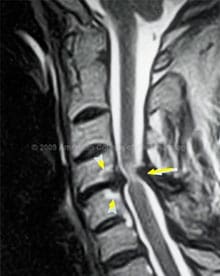Clumsiness, or decreased coordination, can be related to a problem with your neck. Spinal cord compression, or narrowing of the spinal canal in the neck, can at times be asymptomatic except for some subtle changes in coordination. Of course this problem can also commonly cause neck and arm pain, numbness in the extremities, and weakness. However, it is when these symptoms are absent that this diagnosis can be difficult. It is important to seek evaluation of such symptoms as spinal cord compression can lead to a progressive deteriorating syndrome.
 Cervical myelopathy is the medical term that applies to this condition. With prolonged or severe spinal cord compression in the neck from bone spurs or a disc herniation, a patient can begin to experience neurologic symptoms. Symptoms associated with myelopathy can include clumsiness of the hands or feet, decreased coordination, balance issues, walking instability, and bowel or bladder dysfunction. In addition, a patient can have difficulty with fine motor movements such as handwriting, buttoning a shirt, picking up small objects, and/or dropping items.
Cervical myelopathy is the medical term that applies to this condition. With prolonged or severe spinal cord compression in the neck from bone spurs or a disc herniation, a patient can begin to experience neurologic symptoms. Symptoms associated with myelopathy can include clumsiness of the hands or feet, decreased coordination, balance issues, walking instability, and bowel or bladder dysfunction. In addition, a patient can have difficulty with fine motor movements such as handwriting, buttoning a shirt, picking up small objects, and/or dropping items.
Cervical myelopathy can be a serious condition and if ignored can lead to permanent disabilities. These symptoms can often progress quickly, and if present for an extended period of time, cannot be corrected even with surgery. The goal of treatment is to alleviate the pressure on the spinal cord or nerves. This can only be accomplished through surgery. Surgery involves removing the structures pushing on the neurologic structures.
This is often a disc herniation, bone spur, or thickened ligaments. Removing these structures requires secondary stabilization through a cervical fusion. Recovery from this procedure often involves an overnight stay in the hospital, use of a brace, and activity restriction for several weeks. However, patients are often released to progressive activity within one to two months.
Often it is not intuitive that issues with balance or clumsiness can be secondary to a problem in your neck; especially if the neck is asymptomatic. Therefore, one of the most important jobs of a spine specialist is to educate patients with these issues on this condition and what signs and symptoms to watch for. If the patient has any progression of these symptoms, then they should seek immediate attention from a spine specialist.